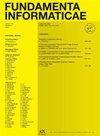Synthesis of Nets with Step Firing Policies
IF 0.4
4区 计算机科学
Q4 COMPUTER SCIENCE, SOFTWARE ENGINEERING
引用次数: 35
Abstract
The unconstrained step semantics of Petri nets is impractical for simulating and modelling applications. In the past, this inadequacy has been alleviated by introducing various flavours of maximally concurrent semantics, as well as priority orders. In this paper, we introduce a general way of controlling step semantics of Petri nets through step firing policies that restrict the concurrent behaviour of Petri nets and so improve their execution and modelling features. In a nutshell, a step firing policy disables at each marking a subset of enabled steps which could otherwise be executed. We discuss various examples of step firing policies and then investigate the synthesis problem for Petri nets controlled by such policies. Using generalised regions of step transition systems, we provide an axiomatic characterisation of those transition systems which can be realised as reachability graphs of Petri nets controlled by a given step firing policy. We also provide a decision and synthesis algorithm for PT-nets and step firing policies based on linear rewards of steps, where fixing the reward of elementary transitions is part of the synthesis problem. The simplicity of the algorithm supports our claim that the proposed approach is practical.具有步进射击策略的网的合成
Petri网的无约束阶跃语义在模拟和建模应用中是不切实际的。在过去,这种不足已经通过引入各种风格的最大并发语义以及优先级顺序得到了缓解。在本文中,我们介绍了一种控制Petri网的阶跃语义的通用方法,该方法通过阶跃触发策略来限制Petri网的并发行为,从而改善其执行和建模特征。简而言之,步骤触发策略在每次标记可执行的已启用步骤子集时禁用。我们讨论了步进触发策略的各种例子,然后研究了由这些策略控制的Petri网的综合问题。利用阶跃过渡系统的广义区域,我们给出了阶跃过渡系统的一个公理性表征,该表征可以用给定阶跃触发策略控制的Petri网的可达图来实现。我们还提供了一种基于步骤线性奖励的pt -net和步骤触发策略的决策和综合算法,其中固定基本转换的奖励是综合问题的一部分。算法的简单性支持了我们提出的方法是实用的说法。
本文章由计算机程序翻译,如有差异,请以英文原文为准。
求助全文
约1分钟内获得全文
求助全文
来源期刊

Fundamenta Informaticae
工程技术-计算机:软件工程
CiteScore
2.00
自引率
0.00%
发文量
61
审稿时长
9.8 months
期刊介绍:
Fundamenta Informaticae is an international journal publishing original research results in all areas of theoretical computer science. Papers are encouraged contributing:
solutions by mathematical methods of problems emerging in computer science
solutions of mathematical problems inspired by computer science.
Topics of interest include (but are not restricted to):
theory of computing,
complexity theory,
algorithms and data structures,
computational aspects of combinatorics and graph theory,
programming language theory,
theoretical aspects of programming languages,
computer-aided verification,
computer science logic,
database theory,
logic programming,
automated deduction,
formal languages and automata theory,
concurrency and distributed computing,
cryptography and security,
theoretical issues in artificial intelligence,
machine learning,
pattern recognition,
algorithmic game theory,
bioinformatics and computational biology,
quantum computing,
probabilistic methods,
algebraic and categorical methods.
 求助内容:
求助内容: 应助结果提醒方式:
应助结果提醒方式:


